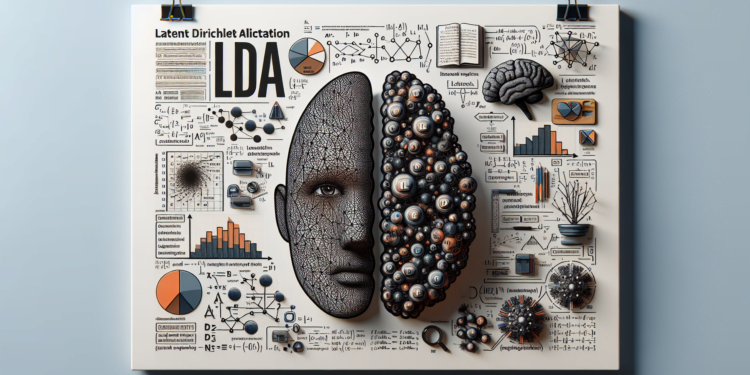In the dynamic and rapidly expanding field of Artificial Intelligence, the technique known as “Latent Dirichlet Allocation” (LDA) has gained notable prevalence in extracting underlying thematic structures in extensive text corpora, fostering advances especially in the area of natural language processing (NLP).
The mathematical essence of LDA is based on the probabilistic generative model, postulating the assumption that documents are mixtures of topics, and these, in turn, are mixtures of words. The mathematical uniqueness of the model lies in the adoption of the Dirichlet distribution to model the distribution of topics within documents and of words within topics, affording a flexibility that captures polysemy and lexical co-occurrence.
Recent work has pushed the development frontiers of LDA beyond its original confines, seeking improved scalability in massive text collections and greater accuracy in topic identification. Algorithms such as Collapsed Gibbs Sampling and variational Bayes have provided tools for performing more efficient inference. In this prospect, the most notable advancement lies in the application of approximate optimization strategies, which allow for quicker convergence in the inferential process and a tightening of the search space.
The leverage of LDA in practical applications has been seen in the systematization of legal documents, sentiment analysis on social networks, and contextual interpretation in recommendation systems. Particularly illustrative case studies include the classification of scientific articles in academic databases, where LDA has been instrumental in unveiling emerging trends and research patterns, and in grouping news into thematic categories for content aggregation platforms.
Comparatively, LDA surpasses matrix factorization techniques such as Non-negative Matrix Factorization (NMF) in its ability to capture deeper co-occurrence and contextual relationships among words. However, the specialization required for tuning hyperparameters and managing asymmetry in the word distribution within documents adds a level of complexity to the process that calls for continuous optimization.
Looking towards the future horizon, research is exploring the union of LDA with deep neural networks. A promising avenue is the development of hybrid models that incorporate deep learning structures, such as recurrent neural networks (RNNs) alongside LDA, opening the gateway to unprecedented refinement in the understanding and generation of natural language. This fusion has the potential to capitalize on the strengths of deep learning for capturing long-term dependencies and attention matrices while retaining the intuitive probabilistic modeling of LDA.
In parallel, integrating ‘topic modeling’ approaches with ontologies and semantic schemas challenges the inherent limitations to LDA’s flexibility and suggests potential for richer semantic analysis. The semantics of the extracted topics could then feed a reasoning system that works in conjunction with topic extraction to propel machine understanding towards a more complex conceptual comprehension.
In a critical analysis, it is imperative to acknowledge both scalability and the quality of topical modeling as ongoing challenges. Current approaches must evolve to accommodate documents of varying lengths and the incorporation of metadata, as well as refine the treatment of polysemy, to achieve a more holistic and precisely contextualized model.
The value of LDA in the realm of Artificial Intelligence continues to reside in its capacity to distill meaningful content from vast amounts of unstructured data. As synergies between advanced machine learning methods and probabilistic topic analysis are explored, we stand at the cusp of unveiling new and even deeper insights from the linguistic data that shape our world.






















